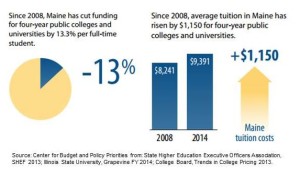As lawmakers gather today to review the state’s higher education budgets, they should consider how a lack of investment in education has stifled Maine’s economy.
Fifty-seven percent of Maine’s college-going seniors enroll in our public institutions―either a University of Maine campus, community college, or the maritime academy―and over 200,000 Maine adults have some college credits but not enough for a degree. The Center on Budget and Policy Priorities released data last week that shows that cuts to Maine’s public university system have forced tuition increases making public college unaffordable, not only for Maine’s high school graduates but also for adults who want to go back to school to finish their degree.
High tuition costs caused by state funding cuts hurt our economy in three ways:
First, evidence shows many would-be college students are deterred by the prospect of debt―and Mainers lacking degrees earn less. A degree carries a significant wage premium in Maine―only four percent of bachelor’s degree holders live in poverty, while almost a third of high school dropouts are poor. A person with a bachelor’s degree earns more than 1.5 times that of a high school graduate and more than $1 million over a life time. And those earnings not only lead to more disposable income and more secure families, but they also boost demand in the economy.
Second, Mainers burdened with student loan debt are forced to delay major decisions such as buying a house, starting a business, or starting a family―which places a drag on overall economic growth. Maine’s average student loan debt of $29,934 places the state 7th when ranking states by student debt load.
Last, hundreds of thousands of Mainers cannot afford to go back to school to finish their degree. The percentage of adult Mainers in the workforce with incomplete degrees is the highest in New England. Because of family and work obligations, working adults more often drop out of college. They are less likely to return to school and more apt to take on debt. Those who have left college are less likely to return if they are weighed down with past debt – some of which may be in default. Lacking a credential, they are stuck in low-paying jobs and falling further behind financially.
Policymakers should take note: The state has every reason to invest in keeping higher education affordable. It builds a skilled workforce, stable families, and a strong state economy.




